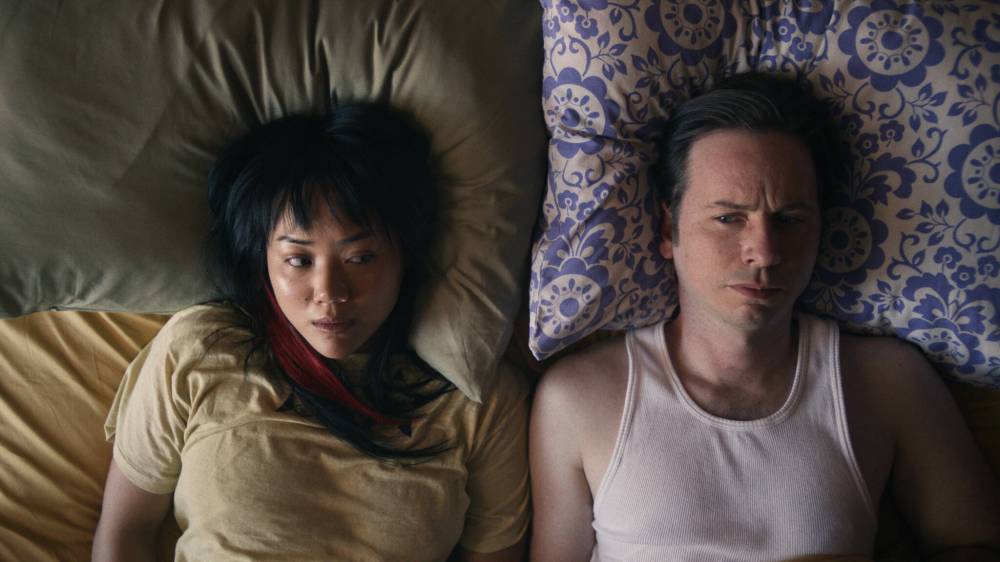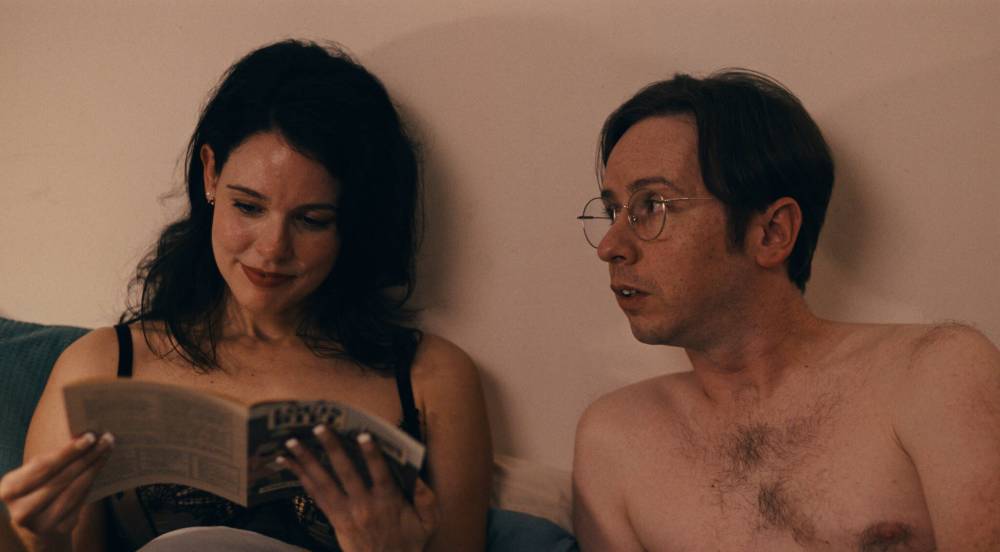Love, sex and a story, based on a story of the real story
Advertisement
Read this article for free:
or
Already have an account? Log in here »
To continue reading, please subscribe:
Monthly Digital Subscription
$0 for the first 4 weeks*
- Enjoy unlimited reading on winnipegfreepress.com
- Read the E-Edition, our digital replica newspaper
- Access News Break, our award-winning app
- Play interactive puzzles
*No charge for 4 weeks then price increases to the regular rate of $19.00 plus GST every four weeks. Offer available to new and qualified returning subscribers only. Cancel any time.
Monthly Digital Subscription
$4.75/week*
- Enjoy unlimited reading on winnipegfreepress.com
- Read the E-Edition, our digital replica newspaper
- Access News Break, our award-winning app
- Play interactive puzzles
*Billed as $19 plus GST every four weeks. Cancel any time.
To continue reading, please subscribe:
Add Free Press access to your Brandon Sun subscription for only an additional
$1 for the first 4 weeks*
*Your next subscription payment will increase by $1.00 and you will be charged $16.99 plus GST for four weeks. After four weeks, your payment will increase to $23.99 plus GST every four weeks.
Read unlimited articles for free today:
or
Already have an account? Log in here »
Hey there, time traveller!
This article was published 22/02/2025 (286 days ago), so information in it may no longer be current.
In 2011, Canadian cartoonist Chester Brown published the controversial (and bestselling) graphic novel Paying For It: A Comic-Strip Memoir About Being A John with Drawn & Quarterly.
The book begins with his girlfriend, Sook-Yin Lee — yes, that Sook-Yin Lee: MuchMusic VJ, CBC broadcaster, actor, writer, musician and director — asking if they could try opening their relationship and Brown agreeing. Extroverted Lee went the conventional (and socially accepted) route of dating other people; introverted Brown, after trying celibacy, started seeing sex workers — and discovered a new kind of intimate relationship.
Now, Paying For It is a film — screening at the Dave Barber Cinematheque until next week — adapted and directed by none other than Sook-Yin Lee.
The Free Press caught up with Lee, who will be at Sunday night’s screening at Cinematheque for a Q&A, for a Q&A of our own. This interview has been edited for length and clarity.
Free Press: Take me back to when you read Chester’s book for the first time. How did you feel about it?
Sook-Yin Lee: I had been doing work on a movie called Shortbus (2006) as an actor. It’s an LGBTQ film, and it was a really big life education for me. I learned so much about what Chester was talking about in Paying For It — there was a direct correlation that he drew between gay liberation and the fight for consensual sex workers to have rights in their work. And, to me that also extended to labour rights and human rights and women’s rights. It really spoke to me.
I was, first of all, thrilled that he made this book and that I was a character in it. I was like, “Yay, I’m in a book by Chester Brown.” And then I was struck by the brilliance of it. I was just like, “Wow, can I make this into a movie?”
I have to stand in line with a bunch of other terrific filmmakers who had the same idea, but then Chester gave me the rights to adapt it because we’re very close friends. He knew that I would make sure that it was delivered in the way that was correct to what he was trying to convey.
FP: Tell me about the process of adapting a graphic novel to film; it’s not exactly a panel-to-frame proposition, necessarily.
SL: At first I was like, Yay, I can do this! And here’s the storyboard because he’s got all these drawings! So my first draft, I essentially transcribed, quite literally, everything the comic was. Chester and I read it, and we’re like, oh my god, this does not work at all. It was clear that graphic novels and movies were very different entities.
Gayle Ye photo Emily Lé (left, with Dan Beirne as Chester Brown) plays Sonny Lee, the alter ego of director Sook-Yin Lee, who wrote the film’s screenplay in consultation with sex workers.
The way he had written it was very episodic, diaristic entries that went from one thing to the next without a narrative shape because it was really an academic treatise for the decriminalization of consensual sex work. The conundrum was how to take the most potent aspects of his argument but really foremost tell a story that comes from the heart and involves people.
And that was difficult. Especially in his graphic novel, he was very protective of the identities and privacy of everyone, including myself. His book is myopically from his perspective, and which is fascinating, but for the movie, I wanted to bring the sex workers to life, and take some of those ideas that he had and spar with him a bit.
FP: You included more of yourself in the film, in the form of your alter ego Sonny Lee (Emily Lé). (Dan Beirne plays Chester Brown.)
SL: So, in the beginning, when Chester told me that he was seeing sex workers, on the outside I look like a progressive, cool chick, but really inside, I was freaking out. Part of me was confused. Part of me was jealous. Part of me was afraid that I would lose him. And it was only through speaking further with Chester about what he had seen and what he was experiencing that then I quickly unlearned my own ignorance. So I think it was important to allow my character, Sonny, to question him at times. Because he is so vulnerable in the book, it really forced me to sort of reveal the things that were happening in my life. I feel enough time had passed that I could take those building blocks of my life and not get mired down in an upsetting diary world of what was happening to me as a 20-something person.
I just truly love Chester so much, and we’ve been through a lot, but there was always a bedrock of care and support with one another that revisiting those events was really a pleasure for me.
FP: Do you think attitudes or moralizing about sex work has changed at all since the book was published? Where does the film take this conversation?
SL: When Chester came out with the book, it was very taboo to talk about the decriminalization of consensual sex work, and yet it is now a conversation that we’re engaging in. When the book came out, there were very few orgs that supported consensual sex workers, and yet now in every single city there are orgs that support and try to bring about an understanding and quest for rights for consensual sex workers.
So there’s a lot of progress being made — movies like Anora (nominated for best picture at this year’s Oscars) and Paying For It. Andrea Werhun (author of the memoir Modern Whore about her time as a sex worker) was a consultant on Anora, and she was a consultant on Paying For It and also acts in the role of (sex worker) Denise.
Supplied Author and film consultant Andrea Werhun also appears in Paying For It, in the role of a sex worker named Denise.
(Prostitution advocate) Valerie Scott was another person who was instrumental to my research for Paying For It. She, along with two other sex workers, struck down anti-prostitution laws in the Supreme Court of Canada, provincially and nationally. It was during a time when the Conservatives were in power and they said, “OK, you win, but we’re enacting a new law, and that is to criminalize clients paying for sex.” That’s where we exist now. It’s like you can have a bookstore full of beautiful books, great books, but you can’t buy a book or read a book.
Oftentimes the media — and I say this as somebody who used to work at the CBC — conflates consensual sex work with sex trafficking. They’re completely different things, and it disables us from having a conversation about labour rights between consenting adult people and it just continues to put them in harm’s way.
FP: You had the experience of reading Chester’s version of events, now he’s seen yours. What does he think about the film?
SL: When Chester saw the rough cut — which is, notoriously, what you just slap together as shooting the movie — he loved it. And I was like, OK, now you’re disqualified. You used to be a tough critic, but now you love the rough cut.
jen.zoratti@winnipegfreepress.com

Jen Zoratti is a columnist and feature writer working in the Arts & Life department, as well as the author of the weekly newsletter NEXT. A National Newspaper Award finalist for arts and entertainment writing, Jen is a graduate of the Creative Communications program at RRC Polytech and was a music writer before joining the Free Press in 2013. Read more about Jen.
Every piece of reporting Jen produces is reviewed by an editing team before it is posted online or published in print – part of the Free Press‘s tradition, since 1872, of producing reliable independent journalism. Read more about Free Press’s history and mandate, and learn how our newsroom operates.
Our newsroom depends on a growing audience of readers to power our journalism. If you are not a paid reader, please consider becoming a subscriber.
Our newsroom depends on its audience of readers to power our journalism. Thank you for your support.

